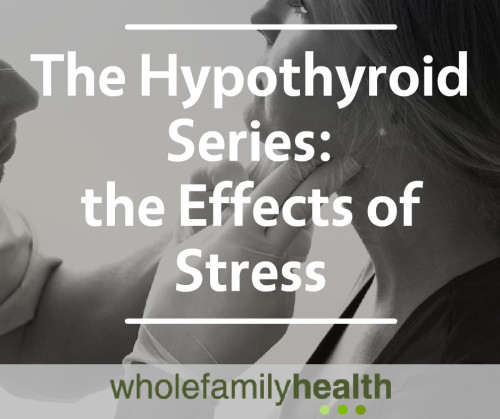The Hypothyroid Series: the Effects of Stress
Posted by Admin

In this article series, I wanted to address how stress can greatly effect the functioning of the thyroid gland. My last article on hypothyroidism covered the anatomy of the thyroid gland and how routine lab testing may not be the most reliable indicator of thyroid status.
There are many factors that can lead to hypothyroidism but stress is one of the most important causes since it is something we all experience in our lives. The obvious stressors we encounter on a daily basis are situations like driving in traffic, rushing to an appointment, busy schedules, or losing a job. One thing I want to point out is other physiological stressor’s that people don’t really consider being an actual “stress,” but in fact they can trigger that same stress response. These include food sensitivities (intolerance), autoimmune issues, digestive issues, blood sugar swings, and underlying inflammation. All these conditions will alert your stress system to turn ON.
Specific hormones (cortisol, epinephrine and norepinephrine) are secreted from the adrenal glands (small glands that sit on our kidneys) to regulate our stress response. These hormones that are secreted play a crucial role in the proper functioning of the thyroid, therefore when stress becomes chronic, our adrenal glands become overworked and therefore throw off the proper functioning of the thyroid gland (explain later in more detail).
Some common symptoms and signs that indicate overworked adrenals:
- Fatigue (with adequate sleep)
- Headaches
- Sugar and caffeine cravings
- Sleep issues
- Mood swings
- Chronically sick
- Anxiety or depression
- Hormone imbalance
- Feeling wired or burnt out
- Low sex drive
- Decreased recovery from exercise
- Increased allergies
Adrenal stress can mimic symptoms of hypothyroidism therefore it is important to consider your adrenal health. Typically it is a combination of both glands being involved, especially if stress is part of your case. This can occur commonly when patients do not improve with synthroid or other thyroid medications, since the adrenals themselves require some support in order to improve thyroid health.
How adrenal stress can directly impact thyroid function:
In my previous article on hypothyroidism I explained the importance of T3 and T4 (our thyroid hormones). The conversion from T4 to T3 is very important since T3 is the active form and the only form that can be used up by our cells.
When our stress response turns ON, inflammatory cytokines (immune factors that initiate responses against infections) interfere with the conversion of T4 to T3. These inflammatory cytokines have also shown to suppress thyroid receptor site sensitivity. This means the thyroid hormones are unable to be used by your cells properly resulting in hypothyroidism (in this case, lab markers TSH, T4, and T3 are usually normal).
Our hypothalamic-pituitary-adrenal (HPA) axis is what controls the body’s reaction to stress and as the name implies, it consists of a network of interactions between the hypothalamus, the pituitary and the adrenal glands. When chronic stress is present, it has been shown that the hypothalamus and pituitary gland function decreases. The hypothalamus and pituitary gland are also both involved in the synthesis of thyroid hormones therefore a disruption in the HPA axis will also cause a decrease in thyroid production, leading to hypothyroid symptoms. The inflammatory cytokines mentioned above also down-regulate the HPA axis and has shown to decrease TSH (thyroid stimulating hormone).
One of the most common causes of hormonal imbalance, seen in the clinic, is due to chronic stress. Cortisol (one of the stress hormones) can decrease the liver’s ability to clear excess estrogens from the body. This excess estrogen in the body increases levels of something called thyroid binding globulin (TBG), which attaches to the thyroid hormone making it inactive and not usable to activate any cellular processes. A high TBG can cause a low T3 and low T4/T3. Birth control pills and estrogen replacements (eg. Premarin) can cause an elevated TBG as well.
When stressed, you are likely more vulnerable to autoimmune thyroid conditions (Hashimoto’s thyroiditis or Grave’s disease). This autoimmune response can cause the thyroid to make too much thyroid hormone, especially after a sudden, stressful change (Grave’s disease). This is why you typically see significant weight loss after say a divorce or death in the family. Excessive, chronic stress can produce the opposite (Hashimoto’s thyroiditis). Adrenal stress can have a profound effect on the immune system regulation. Therefore, if regulation is out of whack, you become more prone to autoimmune diseases.
How to balance your adrenal glands?
Must address all the conditions that cause stress, not just the psychological and emotional stressors, but also the physiological stressors, such as: food intolerances, gut dysfunction, inflammation, blood sugar imbalances, fatty acid deficiencies and anemia.
Some general guidelines:
- Stabilize blood sugar (low carbohydrate diet)
- Stress management and relaxation techniques
- Avoid dietary causes of inflammation (food sensitivities, refined sugars, etc)
- Minimize any stimulants (caffeine)
- Adequate DHA and EPA (Omega-3’s)
- Adequate B vitamins (depleted with chronic stress)
Specific adaptogenic herbs and supplements are typically used to help modulate the stress response and support the adrenal glands. Some include Ashwagandha, Rhodiola, Ginseng, Holy Basil, and Schisandra. These herbs are potent and have a significant effect on the body therefore they should be taken under the supervision of a health care practitioner.
Adrenal Function Testing is also another tool typically used by naturopathic doctors to assess the stage of your adrenal stress. This can further specify what herbs/nutrients would be indicated since treatment does change based on what stage your at currently.
If you are interested in a consultation to learn more about how naturopathic medicine, acupuncture, and Traditional Chinese Medicine can help with thyroid issues, please feel free to contact us today!
